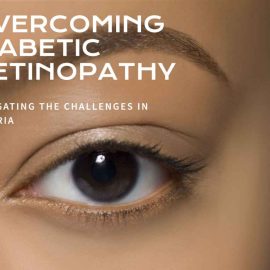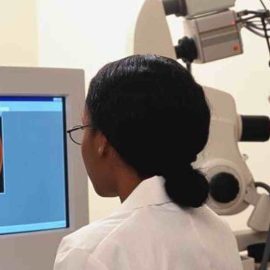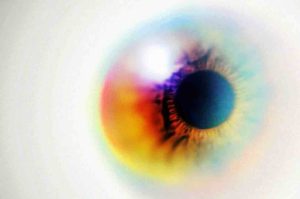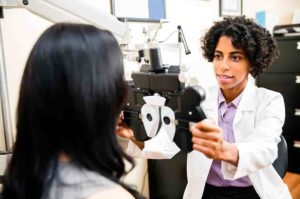Navigating the Challenges of Diabetic Retinopathy in Nigeria
Diabetic retinopathy is a serious complication of diabetes that affects the eyes and can lead to vision loss. Understanding this condition and knowing how to navigate its challenges is crucial for maintaining eye health. In Nigeria, where diabetes is a growing concern, it’s important to be aware of the risk factors, preventative measures, and treatment options available for diabetic retinopathy. This blog post will delve into the complexities of diabetic eye disease and provide valuable insights on how to manage it effectively.
Understanding Diabetic Retinopathy
Diabetic retinopathy is a complication of diabetes that affects the eyes and can lead to vision loss. It is caused by damage to the blood vessels in the retina due to high blood sugar levels. Early detection and management are crucial in preventing irreversible vision loss.
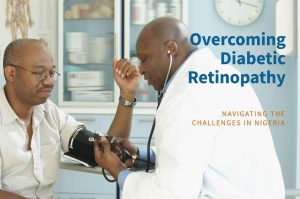
Risk Factors for Diabetic Eye Disease
Several factors can increase the risk of developing the condition:
- Poor Blood Sugar Control: High blood sugar levels can damage the blood vessels in the retina.
- High Blood Pressure: Hypertension can worsen diabetic eye disease.
- High Cholesterol: Elevated cholesterol levels increase the risk of eye complications.
- Smoking: Tobacco use can aggravate diabetic retinopathy.
- Duration of Diabetes: Having diabetes for an extended period increases the likelihood of developing diabetic eye disease.
Preventative Measures for Diabetic Retinopathy
Preventing diabetic retinopathy involves taking proactive steps to manage your diabetes and overall health. Here are some essential preventative measures:
- Maintain Healthy Blood Sugar Levels: Keeping your blood sugar levels within the target range recommended by your healthcare provider through a balanced diet, regular exercise, and medication can help prevent diabetic retinopathy.
- Regular Eye Exams: Schedule regular eye exams with an eye care specialist, such as the Eye Care Center in Lekki, to monitor any changes in your eyes and detecting it early.
- Manage Other Health Conditions: Controlling high blood pressure and cholesterol levels can also reduce the risk of diabetic eye disease. Follow your healthcare provider’s recommendations for managing these conditions.
By taking these preventative measures and staying proactive about your eye health, you can reduce the risk of developing diabetic retinopathy and prevent vision loss.

Impact of Diabetes on Eye Health
Diabetic retinopathy is a serious complication of diabetes that can have a significant impact on eye health. It occurs when high blood sugar levels damage the blood vessels in the retina, leading to vision problems and potential vision loss. Individuals with diabetes need to be aware of the risks associated with diabetic retinopathy and take proactive steps to protect their eye health.
Regular eye exams at the Eye Care Center in Lekki play a crucial role in detecting diabetic retinopathy early. By monitoring the health of the eyes and identifying any changes or abnormalities, healthcare professionals can provide timely treatment to prevent further damage and preserve vision.
It is important for individuals with diabetes to prioritize their eye health and seek regular care from specialists who understand the unique challenges of diabetic retinopathy. By staying informed, proactive, and diligent in their eye care routine, individuals can take control of their eye health and minimize the impact of diabetes on their vision.
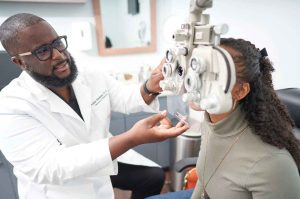
Treatment Options for Diabetic Retinopathy
Early detection and treatment are key in preventing vision loss due to diabetic retinopathy. Here are some common treatment options:
- Medication: Medications may be prescribed to help manage the condition and reduce swelling in the retina.
- Laser Treatment: Laser treatment can be used to seal leaking blood vessels and prevent the growth of abnormal blood vessels in the retina.
- Vitrectomy: In more advanced cases, a surgical procedure called vitrectomy may be necessary to remove blood from the center of the eye.
It is important to consult with your eye care specialist to determine the most appropriate treatment plan for your specific condition.
Importance of Regular Eye Exams
Regular eye exams play a crucial role in the early detection and management of diabetic retinopathy. These exams can help identify any changes in the eyes caused by diabetes, allowing for prompt intervention to prevent vision loss.
By monitoring the health of your eyes through regular eye exams, you can ensure that any signs of diabetic retinopathy are addressed promptly. This proactive approach can help in preserving your vision and overall eye health.
Remember, early detection is key in managing diabetic retinopathy, so schedule your regular eye exams to protect your eyesight and well-being.
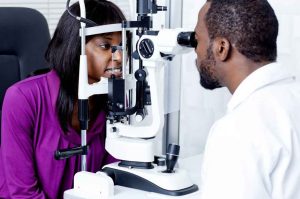
Community Resources for Eye Care
For residents of Lekki looking for quality eye care facilities, there are several options available to address diabetic retinopathy and other eye conditions.
Available Eye Care Facilities:
- Lekki Eye Hospital: Known for its expertise in treating diabetic retinopathy and other eye diseases.
- Lekki Eye Clinic: Offers comprehensive eye care services including diabetic eye examinations.
- Lekki Vision Center: Specializes in advanced treatments for diabetic retinopathy.
- Eyelanders: a leading professional eye care service, offering comprehensive eye care.
Affordable Treatment Options:
Many eye care facilities in Lekki provide affordable treatment options, ensuring access to quality care for all individuals.
Support Groups:
Support groups specifically for individuals with diabetic eye conditions, providing a space for sharing experiences and resources.
Educational Workshops:
Attend educational workshops focused on managing diabetic retinopathy and improving eye health in the community.

Supporting Loved Ones with Diabetic Eye Disease
It is important to be aware of the symptoms of diabetic retinopathy in order to provide early intervention for your loved ones. Encourage them to schedule regular eye exams at a trusted Eye Care Center to monitor and manage their condition effectively.
Offering emotional support and understanding during their treatment journey can make a significant difference. Let them know that they are not alone in dealing with diabetic eye disease and that you are there to support them every step of the way.
Conclusion
In conclusion, diabetic retinopathy is a serious complication of diabetes that can lead to vision loss if not managed properly. It is crucial for individuals with diabetes to prioritize their eye health by maintaining healthy blood sugar levels, getting regular eye exams, and seeking treatment at specialized facilities. By taking preventative measures, understanding the risk factors, and seeking early intervention, individuals can protect their vision and overall well-being. Remember, early detection is key in managing the condition and preventing irreversible vision loss. Stay proactive about your eye health and seek the necessary support and resources available in the community for optimal care.

